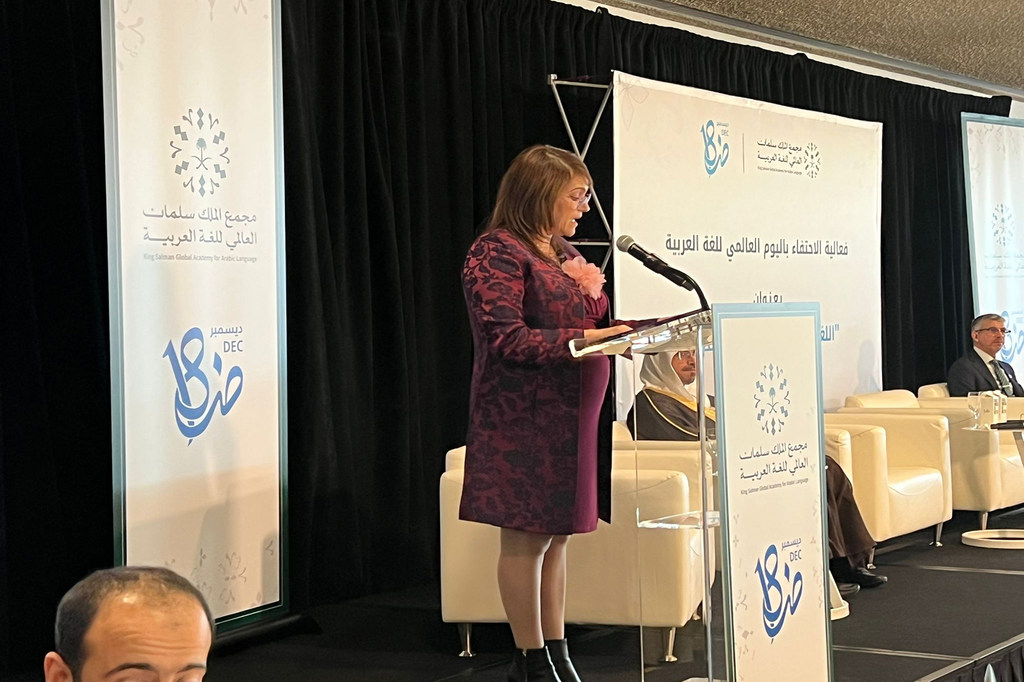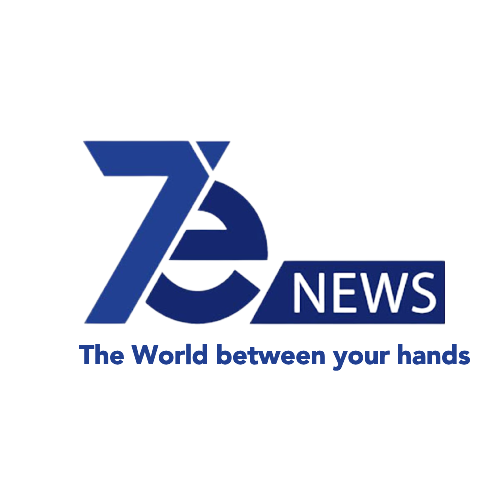UN
In celebration of the International Day of the Arabic Language, the United Nations Headquarters in New York witnessed an event entitled “The
Arabic Language in the United Nations: A 50-Year Journey”. The event was organized by the King Salman International Complex for the Arabic Language, in cooperation with the Permanent Delegation of the Kingdom of Saudi Arabia to the United Nations.

International Arabic Language Day is celebrated annually on December 18th. The Arabic language is a pillar of the cultural diversity of humanity. It is one of the most widespread and used languages in the world, as it is spoken daily by more than 400 million people.
Deputy Secretary-General: The Arabic language carries the voices of poets and philosophers who harness its power to serve humanity
Speaking at the event, the Deputy Secretary-General of the United Nations, Ms. Amina Mohammed, said that languages are more than just means of communication. They embody our humanity, reflect history and culture, and bridge the gap between cultures.
She added that languages facilitate dialogue and cooperation between different countries and societies, and this is necessary in order to achieve the goals of sustainable development for the year 2030. This is also the reason why the United Nations celebrates languages, as she put it.

She said that by celebrating Languages Day, we remind ourselves of the importance of diversity and multilingualism. She added:
“Multilingualism reflects the richness of human existence and enables us to take advantage of the limitless resources for communication, learning and development. Multilingualism promotes solidarity, understanding and tolerance among people. It lies at the heart of the values of the United Nations and our founding principles. In the context of the daunting challenges of conflict, the climate crisis and COVID-19, multilingualism Linguistics can bring us closer.”
The Deputy Secretary-General explained that the Arabic language carries the voices of poets, philosophers and scholars who harness its power to serve humanity, adding that Expo 2020 in Dubai and the World Cup in Qatar attracted global attention to the superior beauty of the Arabic language.

“The organization (the United Nations) operates in Arabic in many field locations where good command of languages is important to communicate with local actors in order to better meet the needs of the people we serve and fulfill our mandate. At headquarters and regional offices our colleagues work tirelessly to ensure that the participants who speak In Arabic they understand and are understood with the aim of making inclusive decisions and enabling Arab speakers to know the work of the United Nations and engage with our vision towards building a more sustainable world.”
In conclusion, the Deputy Secretary-General expressed her appreciation to the colleagues who work daily to communicate the voice of the United Nations in Arabic. “They represent the backbone of the structure of multilateralism .”
President of the General Assembly: The Arabic language promotes communication, diversity, understanding and tolerance
The celebration of the International Arabic Language Day this year comes under the slogan “The Contribution of the Arabic Language to Human Civilization and Culture” . It serves as an appeal to emphasize the abundant contributions of the Arabic language to enriching the cultural and linguistic diversity of humanity, as well as its contribution to the production of knowledge and the important role played by the Arabic language in building bridges of communication between people on the backs of culture, science, literature and many other fields.
The President of the United Nations General Assembly, Chaba Koroshi, said that the slogan for celebrating Arabic Language Day this year is an invitation to reaffirm the important role of the Arabic language in connecting people with culture, science, literature and many other fields.
He pointed out that 49 years have passed since the Arabic language became the sixth official language of the United Nations.

The UN official stressed that language is more than just a means of communication – it is a vessel from which cultural expressionists draw, and a vessel of identity and values. As the lingua franca of nearly 500 million people and the first language of 22 countries – Arabic is truly a reservoir of humanity’s cultural capital.
Mr. Koroshi, who speaks Arabic well, added: “Arabic is the language of the Qur’an, poetry, and art, in addition to being the gateway to knowledge and sciences, philosophy and history.”
Today, he said, we celebrate what multilingualism brings to multilateralism – its ability to foster harmonious communication and promote diversity, understanding and tolerance.
The President of the General Assembly stressed the importance of the great role it plays in development and achieving the goals of sustainable development.
He concluded his speech by saying: “I look at the continuation of the work and the partnership with the Arab countries through the period of my presidency of the general vagina.
A new page to enhance the presence of the Arabic language in the United Nations
Professor Abdullah Al-Washmi, Secretary-General of the King Salman International Academy for the Arabic Language, also spoke, who opened his speech by saying: “When an Arab says to his friend, Welcome, he is, with two words of the Arabic language, shortening the distance of love and friendship, so he shares with his guest the place, the family, and the home.”
The Secretary-General of the Arabic Language Academy, Dr. Abdullah Al-Washmi, speaks at the ceremony.UN News/Nabil Midani The Secretary-General of the Arabic Language Academy, Dr. Abdullah Al-Washmi, speaks at the ceremony.
He continued, saying: “It is the Arabic language, the gateway to culture by which we understand the words of our ancestors 1,600 years ago and to the bright future. It is the link of communication with peoples, the incubator of Arab history. My homeland, the Kingdom of Saudi Arabia, is honored that it was the birthplace of the language and the place of revelation of the Qur’an, and the ancient archaeological inscriptions are still filling Mountains and evidence.
The Saudi official said that the celebration of the 50-year march of Arabic in the United Nations opens a new page to enhance the presence of the Arabic language in the United Nations, noting that the complex has embarked on various qualitative initiatives to enable the Arabic language in international organizations, support the paths of Arabic translation, and build language policies that support the reality of the Arabic language. .
Dr. Abdulaziz Al-Wasel, the permanent representative of the Kingdom to the United Nations, also delivered a speech in which he stressed the importance of concerted efforts to raise the status of the Arabic language internationally.
The Arabic language is one of the pillars of human diversity
Mr. Miguel Angel Moratinos, High Representative of the United Nations Alliance of Civilizations, delivered a recorded speech in which he said that Arab culture is the culture closest to his heart, indicating that he has always had a great admiration for the Arabic language.
Moratinos – who is from Spain – referred to the great influence of the Arabic language on the Spanish language, saying that the Arabic language represents a pillar of diversity for humanity and is one of the most common languages in the world.
He said that the celebration is a reminder of the historical role played by the Arabic language in the transmission of knowledge.
The Arab League praises the role of the Arab academies
The Minister Plenipotentiary and Acting Chargé d’Affairs, Dr. Nasiriyah Al-Arja Fleiti, delivered a speech at the event on behalf of the Secretary-General of the League of Arab States, where she said: “This language, which was and still is connecting the two bridges in the south and north, and extends to exceed its speakers, or nearly a billion speakers, between proud, loving and proficient.”
She emphasized that our celebration of the Arabic Language Day is nothing but appreciation and gratitude from all of us for the splendor, beauty, value and majesty of this language.
She expressed the Arab League’s appreciation for the role played by the linguistic academies accredited by a number of member states, based on the language academy in Baghdad and the language academy in Cairo, as historical teachers who contributed to preserving the Arabic language and consolidating its linguistic foundations across generations in pronunciation, morphology, semantics, translation, and dissemination of it to non-native speakers.
She also praised the efforts made by the “King Salman International Academy for the Arabic Language” in serving the Arabic language.
New book launch
The event also witnessed an introductory visual presentation on the International Day of the Arabic Language, in addition to the launch of a book entitled: “The History of the Arabic Language in the United Nations Organization.”
On the occasion of Arabic Language Day, UNESCO also organized a group of panel discussions and cultural events in the French capital, Paris.


